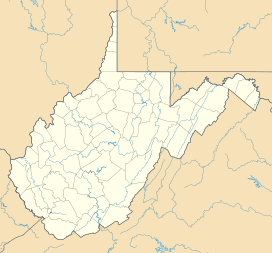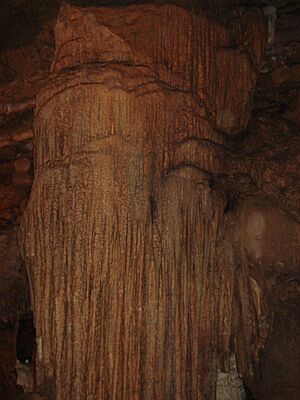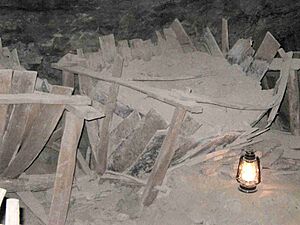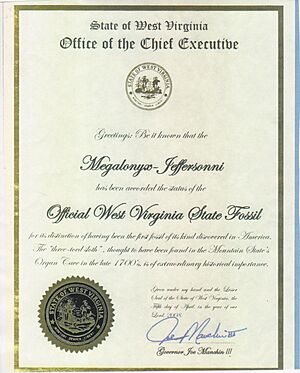Organ Cave facts for kids
Quick facts for kids Organ Cave |
|
|---|---|
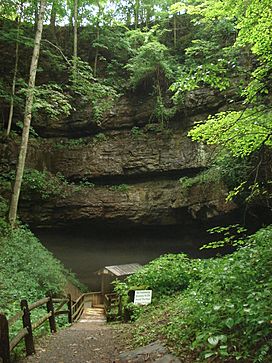
The main historical (and commercial) entrance to Organ Cave
|
|
| Floor elevation | 2,188 ft (667 m) |
| Length | 38.452 miles (61.882 km) |
| Geography | |
| Location | United States, West Virginia, Greenbrier |
Organ Cave is a very large and historic cave in Greenbrier County, West Virginia, USA. The town nearby is even named after this amazing cave!
The Organ Cave System is a special place. It was named a National Natural Landmark in 1973. This means it's a very important natural area. People also call it the Organ–Hedricks Cave System. It was recognized for being the biggest cave system in West Virginia at the time. It also has many old saltpeter vats and troughs. Saltpeter was used to make gunpowder.
Organ Cave is now the third-longest known cave in West Virginia. It is also listed on the National Register of Historic Places since 2005. This means it's important for history too.
Contents
Discovering Organ Cave
Organ Cave holds many secrets from the past. Scientists have found amazing fossils here. These fossils tell us about animals that lived long ago.
A Peek into the Past
Ancient Animals and Early People
Imagine giant animals roaming West Virginia! In Organ Cave, fossils of huge creatures have been found. These include the giant ground sloth, grizzly bear, and even a sabre-tooth cat. There were also reindeer and Ice Age porcupines.
Early Native Americans also used the cave. They left behind flint arrowheads. These tools show that people explored the cave many years ago. Some people think early white settlers were there in 1704. However, the first settlers in Greenbrier County arrived later, around the 1740s.
Gunpowder and the Civil War
For a long time, Organ Cave was a source of nitre, also called saltpeter. This mineral was very important for making gunpowder. Before 1835, people were already mining it from the cave.
During the American Civil War, Confederate soldiers used the cave again. They mined nitre under the command of General Robert E. Lee. Today, Organ Cave has the largest collection of Civil War-era saltpeter hoppers in the country. These hoppers were used to turn cave dirt, which was rich in calcium nitrate, into potassium nitrate for gunpowder.
How Big is Organ Cave?
Cave explorers, called speleologists, first mapped Organ Cave in July 1948. For many years, people thought it was the longest cave in the world!
As of March 11, 2022, the Organ Cave System has about 38.452 miles (61.885 kilometers) of mapped passages. This makes it the 55th longest cave in the world. It is also the 16th longest in the United States. In West Virginia, it ranks as the 3rd longest cave.
The Mystery of the Giant Sloth
A very famous fossil discovery is linked to Organ Cave. This is the fossil of Thomas Jefferson's giant ground sloth (Megalonyx jeffersonii). Thomas Jefferson, who later became president, received this fossil in 1796. He got it from a friend who lived nearby.
For a long time, people believed this fossil came from Organ Cave. A local man named Andrew Price helped make this idea popular. However, in 1995, a scientist named Frederick Grady suggested a different cave. He thought Haynes Cave in nearby Monroe County was the real source. He looked at old land records to figure this out.
Even with this new idea, the story of the sloth and Organ Cave continued. In 2008, the governor of West Virginia held a ceremony at Organ Cave. He presented a certificate saying Megalonyx jeffersonii was the "Official West Virginia State Fossil." The certificate also repeated the idea that it was found in Organ Cave.
See also
- List of National Natural Landmarks
- List of National Natural Landmarks in West Virginia
- List of longest caves in the United States
 | James B. Knighten |
 | Azellia White |
 | Willa Brown |


